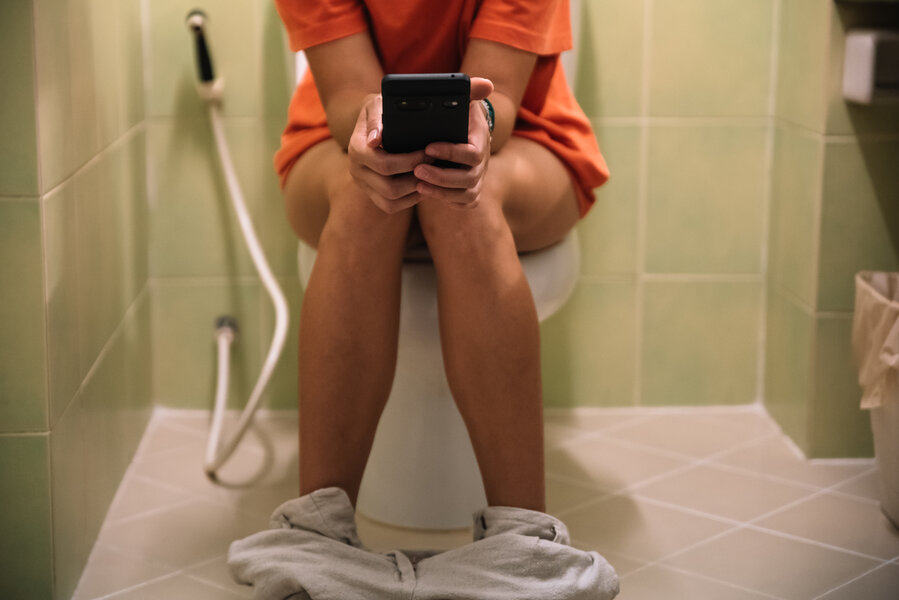Travel
Why Can’t I Poop on Vacation?

It’s a crazy thing, how our bodies seem to sense when we’re not in our primary place of residence. It’s almost as though our GI tracts want to punish us for seeking adventure abroad. While some travelers worry about having to visit the bathroom too often, others experience the opposite problem, which some TikTokers have taken to calling “the out of town shutdown.” Before you find yourself in some French pharmacy, awkwardly gesticulating your request for a laxative, work on combating blockage ahead of your trip.
To help us better understand those stubborn colons, we reached out to Roslyn Kent, a registered nutritionist at Plants First Nutrition. A self-described “constipation nutritionist,” Kent helps her clients get their bowels in rhythm and repair their microbiome. In other words, she seeks to crack the code many primary care physicians haven’t been able to figure out.
“I think because most doctors are so fixated on addressing the symptoms rather than the root cause, there’s no incentive to branch out beyond medications,” Kent says. “Medications have their place, but I don’t think there’s enough focus on preventative care—looking at diet and lifestyle factors.” The elusiveness of this dilemma is perhaps the reason the internet has banded together, finding comedic relief in each other’s pooping struggles—especially on vacation.
Here’s everything you need to know about mastering your motility on the go.
Why do we get constipated on vacation?
Circadian rhythm
Perhaps the biggest culprit, Kent says, is the shift in our body clock that occurs when we travel across time zones. If you normally have a bowel movement in the morning, and you’re up against an 8-hour time difference, let’s say, your body needs a bit of time to adjust to the idea of pooping at night instead.
Being sedentary
Sitting on an airplane or in a car for long periods of time is not ideal for the stomach. “If you have any backed up stool at all in your colon, that’s going to be producing methane gas,” Kent explains. “When you’re sedentary, those gasses are just accumulating, and they’re not being given the opportunity to shift around as much or be released in the same way they normally would if we were up and about and moving.”
Changes in diet
It’s a no-brainer that when we’re on vacation, we’re going to treat ourselves to all the saturated fats—maybe a bit more alcohol, too. Fried, fatty, processed, and sugary foods tend to slow things down. “I’m not saying you can’t enjoy the gelato when you’re in Italy, but maybe not every single day, because sugar is really gas-forming,” Kent says. And while alcohol can cause diarrhea for some, it can cause constipation in others. But it’s not just what we’re eating; it’s when we’re eating. Not sticking to our regular three meals a day can throw things out of whack. And then there’s likely a factor of dehydration: We might say no to that water bottle on the plane, hesitant to ask our seatmate to get up to go to the bathroom, or just forget to hydrate while we’re on the move.
Uncomfortable environments
Your home toilet is your safe place, likely a low-stress environment that will allow you to fully eliminate. Believe it or not, pooping in a foreign location can cause a mind-body snafu. “If you’re traveling and your poop schedule is off, you’re probably going to get the urge to go in a public place—and that’s probably the worst case scenario for a lot of people,” Kent says. Psychosomatic factors can absolutely suppress your urge to go. “When you’re anxious about where you are, or your inability to use the washroom, that’s actually going to cause the colon to constrict or spasm, causing thinner bowel movements.”
Are women more prone to constipation?
Remember when the internet declared that “hot girls have IBS?” There might be an explanation for that. Female colons, Kent explains, are about 30 centimeters longer on average than that of men. “Because of that, we’re more prone to having an extra long, twisty colon, otherwise known as a redundant colon,” she says. Then there are the hormonal changes brought about by our menstrual cycles, which impact our bowel movement schedule.
How do we know we’re really backed up?
Kent defines constipation as the “inability to fully empty your bowels.” If you struggle with travel constipation, it’s likely not the trip alone that’s causing the struggle; you were probably backed up before you got on that plane, without even realizing it. To see where you stand, Kent recommends performing a “transit test” before you leave, which simply involves consuming a half a cup of canned or frozen corn at dinner. Don’t chew it to the point of mush, but chew it enough to swallow, then see how long it takes for those kernels to appear in your stool. “I have worked with clients where it takes them three weeks to see the corn,” Kent says. The ideal transit time, the nutritionist says, is 12 to 18 hours. “If you’re already backed up before you get to your destination, it’s not going to get better once you arrive,” she says. “It’s only going to get worse.”
How to relieve travel constipation
So you’ve done the transit test before your trip, and those kernels are taking their sweet time to show up. It’s time to turn to a motility agent. “A motility agent is a broader category of any laxatives, herbs, medications or supplements that predictably get your bowels moving,” Kent explains. “So I wouldn’t consider foods like prunes or kiwis a motility agent, for instance, because they’re not always going to work, but medications or supplements like magnesium citrate or magnesium oxide, milk of magnesia, or MiraLAX are all options.”
The idea here is to take these supplements regularly, rather than troubleshooting on vacation with an intense laxative (clearing out in this way can be pretty unpleasant). “Start on a routine before you leave, getting that bowel rhythm established with daily, consistent use. And once you’re on the trip, things will continue to move,” Kent says. “A body in motion stays in motion unless acted on by an outside force. So yes, that outside force could be traveling, but the idea is that you’re going to do the best you can with diet and lifestyle choices and take that motility agent once you arrive.”
There are a few other aids you can call in as well. Kent recommends packing a few foods that help with digestion, like bags of fennel or ginger and lemon tea. “Sometimes I’ll bring a bag of pre-made oatmeal or muesli mixed with chia seeds or ground flax with me, so I’m not scrambling to find a breakfast option, because breakfast options when we’re out are likely going to be really rich in saturated fat and not super rich in fiber,” Kent says. The nutritionist also suggests opting for cooked foods instead of raw foods in the evening, as raw foods can cause excess gas production if they’re not perfectly broken down in your mouth.
Taking something to help you sleep will also help your circadian rhythm get back on track. Kent recommends the sleep supplement from Arrae, or a medicinal mushroom like Reishi, along with the usual suspects, like eye masks and earplugs. She makes sure to try and get at least two to three liters of water a day while she’s traveling and avoids skipping meals. “That’s going to initiate satiety signals to help me have a bowel movement,” she says. Walking is also an excellent idea, as it helps to get things moving, but luckily, steps are likely a given on adventurous itineraries.
Kent’s most important tip? Make time for poop in the morning. “When most people are traveling, they’re rushing in the morning, like, Got to get out of the hotel or I’ll miss my day, and they’re not making time to poop,” she says. “But if you get the urge later and you’re in a public place, there’s a really good chance you’re going to subconsciously suppress that urge to go. Take some time, an extra 20 minutes or so, drink some water, and see if the urge arises.”









